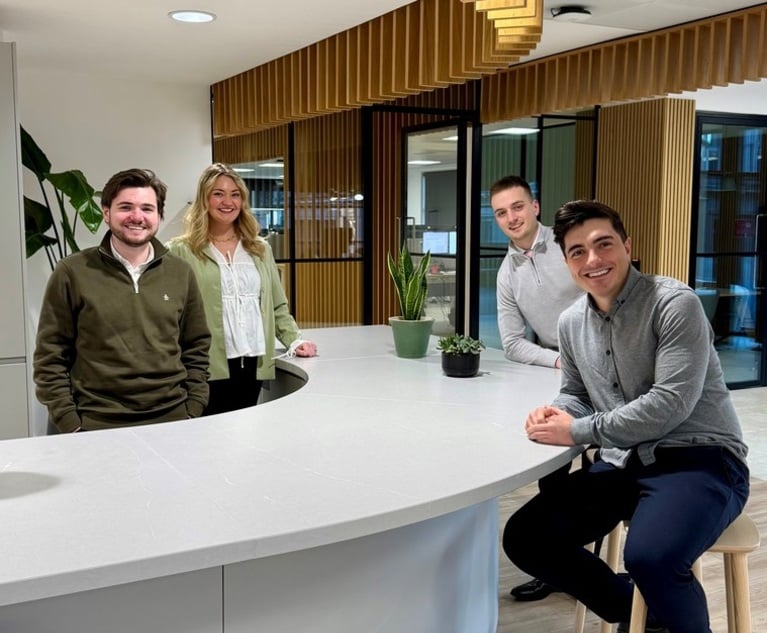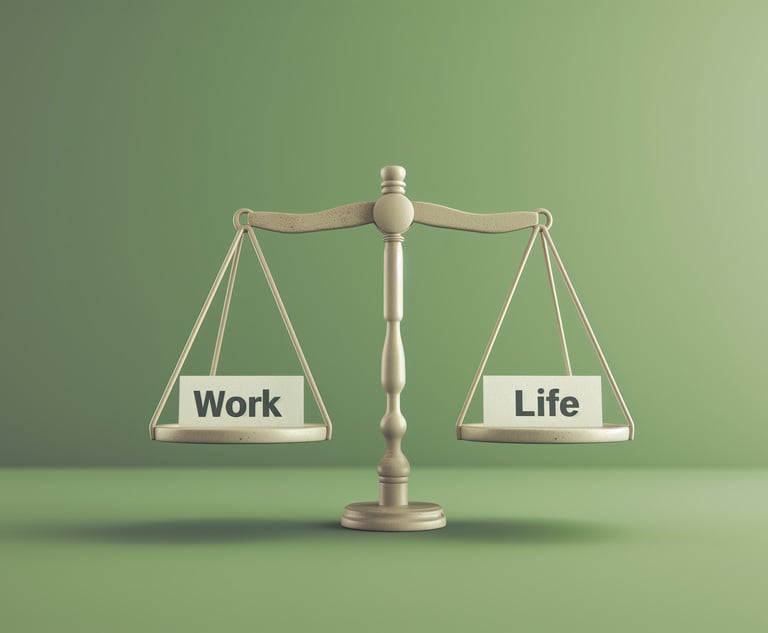'I Didn't Think I'd Ever Come Back To Work' – How a Magic Circle Partner Overcame Personal Trauma Following His Wife's Death
Clifford Chance partner Jeremy Connick shares his personal journey of mental health recovery.
May 15, 2019 at 04:34 AM
4 minute read
 Going back to work after losing a loved one is never an easy thing, let alone battling a mental health issue in the aftermath.
Going back to work after losing a loved one is never an easy thing, let alone battling a mental health issue in the aftermath.
Clifford Chance lifer Jeremy Connick joined the firm straight out of university in 1986, and it was there that he met his wife, Alison.
The couple relocated to Hong Kong, where Alison took up a role at a telecoms company, before they later moved to the U.S. By the time they returned to London in 2003, he had been made a partner in the Magic Circle firm's energy department and they had three children.
Then, in April 2014, everything changed. Alison received terrible news – she had breast cancer. She battled through a lumpectomy and radiation therapy but tragically, three months later, in the midst of a depressive episode, she took her own life.
Immediately after his wife's death, Jeremy couldn't think about anything. Tasks that were once simple became impossible to complete as he suffered with memory loss and an inability to concentrate on anything.
"I didn't care about work at all at that point, it didn't feature in my thoughts"
Despite his deteriorating mental health, Jeremy's priority was to look after his children, who were 18, 17 and 14 years old at the time of Alison's death. He ended up taking a year off work to recuperate and deal with the tragedy.
"I didn't care about work at all at that point, it didn't feature in my thoughts," Connick says. "I didn't think I'd ever come back, it was totally unimportant to me."
When he returned to the firm the following year, getting back into the working environment was made even more challenging by his poor mental health. "Your brain doesn't suddenly work again as it did," he says. "I had to teach myself to work in a different way until my brain did function again.
"My clients were amazing about it, as were my colleagues, but pretty much everyone around me had to accept that I wasn't functioning as well as I used to.
"My primary reason for going back to work was to demonstrate to the kids that it was recovery time and it was time to move forward"
"I was in survival mode. My primary reason for going back to work was to demonstrate to the kids that it was recovery time and it was time to move forward. And then after a while, putting on a suit, interacting with people and laughing again, taking myself out of my heartbreak – it helped. Slowly, I've gotten back to being pretty fully functional."
As he started to settle back into the work environment and his mental state improved, he "spent some time thinking about what it would be like if you weren't at my level of seniority – fully supported – and not having to think about whether you earned an income".
"I realised that the support systems that were already in place were inadequate for a large proportion of the organisation. It's been interesting in the last five years to see how much the dial has moved in terms of mental health awareness in law firms and generally speaking."
Connick is now a trustee for grant-giving organisation Beyond Shame Beyond Stigma, a mental health charity supporting young people – something that he finds "incredibly rewarding".
"It's easy to recognise poor mental health in other people if you've been through some trauma"
While his motives for getting involved in the mental health sphere were to "get some good out of what was a sh*tty situation", he now feels a responsibility to speak about mental health awareness.
"It's easy to recognise poor mental health in other people if you've been through some trauma. I used to think I was quite an empathetic person but I couldn't really have put myself in someone else's shoes. Now I think I feel what other people feel when they suffer.
"At the firm and across the City, people are waking up to the idea that people are not working to the best of their ability, because of things that are happening in their life. It's just all too much for them to operate to the best of their ability. Whether you care about the business or about the person, it's essential that we find a way to look after that person."
This content has been archived. It is available through our partners, LexisNexis® and Bloomberg Law.
To view this content, please continue to their sites.
Not a Lexis Subscriber?
Subscribe Now
Not a Bloomberg Law Subscriber?
Subscribe Now
NOT FOR REPRINT
© 2025 ALM Global, LLC, All Rights Reserved. Request academic re-use from www.copyright.com. All other uses, submit a request to [email protected]. For more information visit Asset & Logo Licensing.
You Might Like
View All
‘Raises More Questions Than Answers’: Partners Puzzled by Leadership Change at UK Competition Regulator


Long Hours, Lack Of Boundaries: Associates In India Are Leaving Their Firms
Trending Stories
- 1No Two Wildfires Alike: Lawyers Take Different Legal Strategies in California
- 2Poop-Themed Dog Toy OK as Parody, but Still Tarnished Jack Daniel’s Brand, Court Says
- 3Meet the New President of NY's Association of Trial Court Jurists
- 4Lawyers' Phones Are Ringing: What Should Employers Do If ICE Raids Their Business?
- 5Freshfields Hires Ex-SEC Corporate Finance Director in Silicon Valley
Who Got The Work
J. Brugh Lower of Gibbons has entered an appearance for industrial equipment supplier Devco Corporation in a pending trademark infringement lawsuit. The suit, accusing the defendant of selling knock-off Graco products, was filed Dec. 18 in New Jersey District Court by Rivkin Radler on behalf of Graco Inc. and Graco Minnesota. The case, assigned to U.S. District Judge Zahid N. Quraishi, is 3:24-cv-11294, Graco Inc. et al v. Devco Corporation.
Who Got The Work
Rebecca Maller-Stein and Kent A. Yalowitz of Arnold & Porter Kaye Scholer have entered their appearances for Hanaco Venture Capital and its executives, Lior Prosor and David Frankel, in a pending securities lawsuit. The action, filed on Dec. 24 in New York Southern District Court by Zell, Aron & Co. on behalf of Goldeneye Advisors, accuses the defendants of negligently and fraudulently managing the plaintiff's $1 million investment. The case, assigned to U.S. District Judge Vernon S. Broderick, is 1:24-cv-09918, Goldeneye Advisors, LLC v. Hanaco Venture Capital, Ltd. et al.
Who Got The Work
Attorneys from A&O Shearman has stepped in as defense counsel for Toronto-Dominion Bank and other defendants in a pending securities class action. The suit, filed Dec. 11 in New York Southern District Court by Bleichmar Fonti & Auld, accuses the defendants of concealing the bank's 'pervasive' deficiencies in regards to its compliance with the Bank Secrecy Act and the quality of its anti-money laundering controls. The case, assigned to U.S. District Judge Arun Subramanian, is 1:24-cv-09445, Gonzalez v. The Toronto-Dominion Bank et al.
Who Got The Work
Crown Castle International, a Pennsylvania company providing shared communications infrastructure, has turned to Luke D. Wolf of Gordon Rees Scully Mansukhani to fend off a pending breach-of-contract lawsuit. The court action, filed Nov. 25 in Michigan Eastern District Court by Hooper Hathaway PC on behalf of The Town Residences LLC, accuses Crown Castle of failing to transfer approximately $30,000 in utility payments from T-Mobile in breach of a roof-top lease and assignment agreement. The case, assigned to U.S. District Judge Susan K. Declercq, is 2:24-cv-13131, The Town Residences LLC v. T-Mobile US, Inc. et al.
Who Got The Work
Wilfred P. Coronato and Daniel M. Schwartz of McCarter & English have stepped in as defense counsel to Electrolux Home Products Inc. in a pending product liability lawsuit. The court action, filed Nov. 26 in New York Eastern District Court by Poulos Lopiccolo PC and Nagel Rice LLP on behalf of David Stern, alleges that the defendant's refrigerators’ drawers and shelving repeatedly break and fall apart within months after purchase. The case, assigned to U.S. District Judge Joan M. Azrack, is 2:24-cv-08204, Stern v. Electrolux Home Products, Inc.
Featured Firms
Law Offices of Gary Martin Hays & Associates, P.C.
(470) 294-1674
Law Offices of Mark E. Salomone
(857) 444-6468
Smith & Hassler
(713) 739-1250









